Breast Cancer Battles
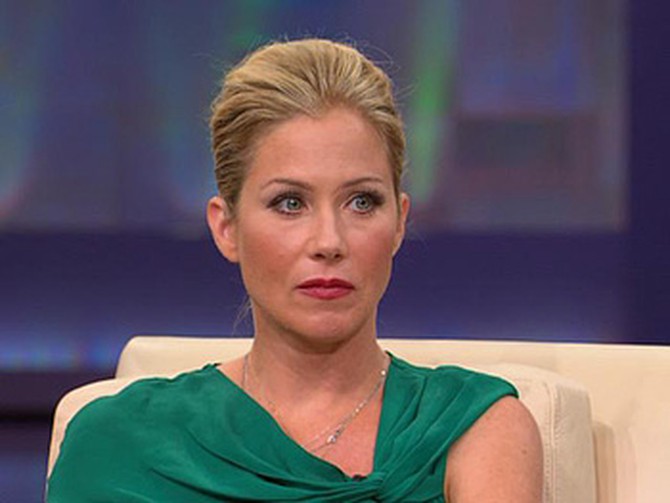
For more than 20 years, actress Christina Applegate has kept audiences laughing. During her teenage years, she lit up the small screen as Kelly Bundy on the hit sitcom Married with Children. After 11 hilarious seasons, Christina's career branched out to the big screen and Broadway.
In 2007, Christina landed the starring role on Samantha Who?, an ABC comedy series. After receiving Emmy and Golden Globe nominations for her performance, it seemed that nothing could stop Christina's triumphant return to TV.
Then, in April 2008, shocking news silenced the laughter. At 36 years old, Christina was diagnosed with breast cancer. At first, Christina says she lived quietly with the disease. "It's hard to live quietly," she says. "I went through five weeks of work without telling anyone that this was going on in my life."
Now, Christina is going public with her personal battle to raise awareness among young women who may not think they're at risk.
In 2007, Christina landed the starring role on Samantha Who?, an ABC comedy series. After receiving Emmy and Golden Globe nominations for her performance, it seemed that nothing could stop Christina's triumphant return to TV.
Then, in April 2008, shocking news silenced the laughter. At 36 years old, Christina was diagnosed with breast cancer. At first, Christina says she lived quietly with the disease. "It's hard to live quietly," she says. "I went through five weeks of work without telling anyone that this was going on in my life."
Now, Christina is going public with her personal battle to raise awareness among young women who may not think they're at risk.
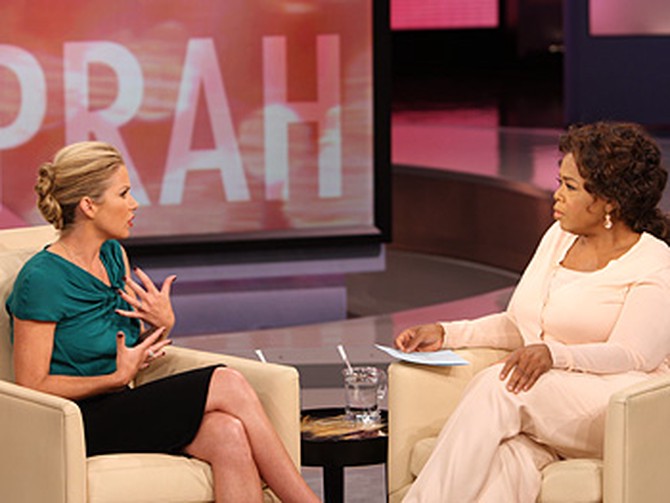
As the daughter of a breast cancer survivor, Christina says she's been vigilant about getting regular mammograms since she was 30 years old. In 2007, doctors recommended extra precautions. "My doctor said that the mammograms weren't enough for me because of the denseness of my breasts," she says. "He suggested that I get an MRI."
Christina went in for her first MRI screening, which produced disturbing results. "They found some funky things going on [in one breast]," she says. Doctors told her they needed to perform a biopsy. Then, the excruciating waiting game began.
Christina continued to work and promote her sitcom, but the impending results were never far from her mind. A week later she says she got the phone call every woman dreads. "[The doctor said], 'It came back positive,'" she says. "Right now I'm sitting here shaking remembering that moment."
Doctors explained that the cancer was only in her left breast, and thankfully, they caught it at an early stage. Christina says she held back her tears and immediately went into survival mode.
Christina went in for her first MRI screening, which produced disturbing results. "They found some funky things going on [in one breast]," she says. Doctors told her they needed to perform a biopsy. Then, the excruciating waiting game began.
Christina continued to work and promote her sitcom, but the impending results were never far from her mind. A week later she says she got the phone call every woman dreads. "[The doctor said], 'It came back positive,'" she says. "Right now I'm sitting here shaking remembering that moment."
Doctors explained that the cancer was only in her left breast, and thankfully, they caught it at an early stage. Christina says she held back her tears and immediately went into survival mode.
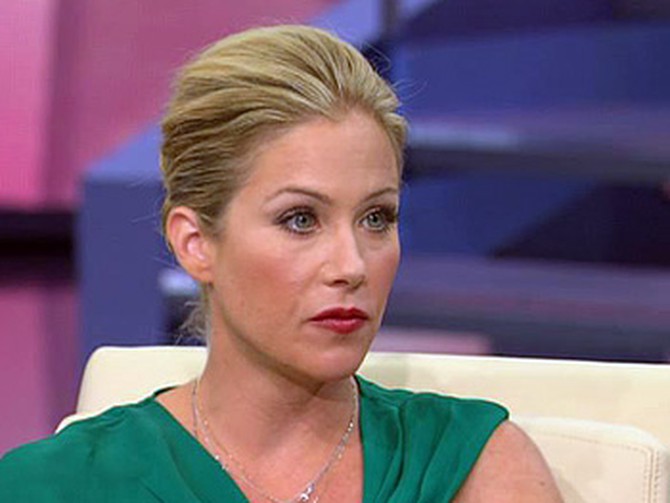
The day after her diagnosis, Christina says she went in to see an oncologist and a surgeon. "I'm a Sagittarius," she says. "We need things done now. So, for me, I had to get in now, and I wanted to have my surgery now."
Within a week, Christina had her first lumpectomy. Doctors also did a biopsy of her lymph nodes to make sure the cancer hadn't spread. Since the cancer was caught early on, Christina was told she'd need six weeks of radiation instead of chemotherapy.
Then, she received more life-changing news. A test for the BRCA gene—also known as the "breast cancer gene"—came back positive. "That sort of changed everything for me," she says. "Radiation was something temporary, and it wasn't addressing the issue of this coming back or the chance of it coming back in my left breast. I sort of had to kind of weigh all my options at that point."
Christina was given two options...go forward with the radiation treatments and continue testing for the rest of her life or have both breasts removed.
Within a week, Christina had her first lumpectomy. Doctors also did a biopsy of her lymph nodes to make sure the cancer hadn't spread. Since the cancer was caught early on, Christina was told she'd need six weeks of radiation instead of chemotherapy.
Then, she received more life-changing news. A test for the BRCA gene—also known as the "breast cancer gene"—came back positive. "That sort of changed everything for me," she says. "Radiation was something temporary, and it wasn't addressing the issue of this coming back or the chance of it coming back in my left breast. I sort of had to kind of weigh all my options at that point."
Christina was given two options...go forward with the radiation treatments and continue testing for the rest of her life or have both breasts removed.

Christina made the dramatic decision to have a bilateral mastectomy. "It came on really fast. It was one of those things that I woke up and it felt so right," she says. "It just seemed like, 'I don't want to have to deal with this again. I don't want to keep putting that stuff in my body. I just want to be done with this.' ... I was just going to let them go."
Before she went in for her surgery, Christina says she staged her first—and last—nude photo shoot. "I made sure that I have close-up photographs of them from every angle so I can kind of remember them," she says.
Christina's tears finally spilled over the day she met her surgeon. "I met with my doctor, and I told him that was my decision," she says. "He brought the surgeon in, and it was like it was the floodgates just opened up and I lost it."
In July 2008, Christina went through with the surgery, which has left physical and emotional scars. "It can be very painful," she says. "It's also a part of you that's gone, so you go through a grieving process and a mourning process."
Before she went in for her surgery, Christina says she staged her first—and last—nude photo shoot. "I made sure that I have close-up photographs of them from every angle so I can kind of remember them," she says.
Christina's tears finally spilled over the day she met her surgeon. "I met with my doctor, and I told him that was my decision," she says. "He brought the surgeon in, and it was like it was the floodgates just opened up and I lost it."
In July 2008, Christina went through with the surgery, which has left physical and emotional scars. "It can be very painful," she says. "It's also a part of you that's gone, so you go through a grieving process and a mourning process."
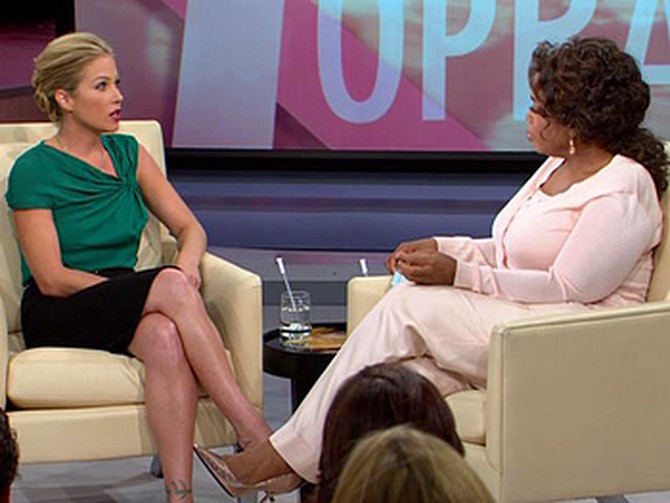
Before she went under the knife, Christina says the only mastectomy she'd ever seen was the one her mother received. "[Her surgery] was in the '70s, and they didn't do a very good job back then," she says. "So in my own mind I'm thinking, 'My God, I'm going to be butchered, and it's going to be horrible. I'm never going to love that part of me again.' ... But I did a lot of research, and they can make some pretty boobies."
Currently, Christina says she has saline expanders in her body, which will make way for the new implants. Though she's proud of her proactive decision, she says she's reminded of her loss every day.
"It doesn't feel the same, and it's hard to carry your purse," she says. "I cry at least once a day about it because it's hard to overlook it when you're standing there in the mirror. When you look down, it's the first thing you see. ... So you're reminded constantly of this thing—this cancer thing that you had."
On the bright side, Christina says she won't have to wear a bra ever again. She also feels victorious in the fight against breast cancer. "I have taken a very progressive stance in the rest of my life," she says. "For that, I'm really grateful."
Currently, Christina says she has saline expanders in her body, which will make way for the new implants. Though she's proud of her proactive decision, she says she's reminded of her loss every day.
"It doesn't feel the same, and it's hard to carry your purse," she says. "I cry at least once a day about it because it's hard to overlook it when you're standing there in the mirror. When you look down, it's the first thing you see. ... So you're reminded constantly of this thing—this cancer thing that you had."
On the bright side, Christina says she won't have to wear a bra ever again. She also feels victorious in the fight against breast cancer. "I have taken a very progressive stance in the rest of my life," she says. "For that, I'm really grateful."
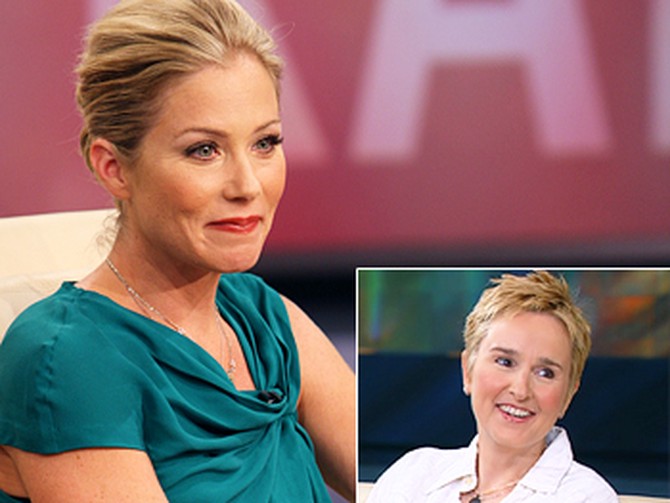
Days after her diagnosis, Christina says she reached out to family and friends, including Melissa Etheridge, a Grammy winner and breast cancer survivor. Melissa shared the lessons she learned during the fight for her own life.
"The first thing she said to me is: 'Christina, this is a blessing that's happened to you in your life. Right now, you get to start over, and right now you get to change everything—the way that you deal with things in life, the way that you react to things. Fear can hurt you. Stress can hurt you. This is the time that you have this opportunity to change the way you eat...everything you do,'" Christina says.
Christina now looks at her health scare as a blessing. "I am a 36-year-old person with breast cancer, and not many people know that that happens to women my age or women in their 20s," she says. "This is my opportunity now to go out and fight as hard as I can for early detection."
As she's learned, early detection may not come from a mammogram. Christina says she will fight for women to have access to MRIs and genetic testing, which many insurance companies won't pay for.
Christina says her health scare has shifted her priorities completely. "[There's] this need and this desire to make every single day count," she says. "I used to say ... 'Don't sweat the small stuff—not even the big stuff.' At the end of the day, none of it matters but your own joy, your own spiritual journey that you go on, God, your loved ones, your friends, your animals. These are the things you've got to cherish and love and embrace."
"The first thing she said to me is: 'Christina, this is a blessing that's happened to you in your life. Right now, you get to start over, and right now you get to change everything—the way that you deal with things in life, the way that you react to things. Fear can hurt you. Stress can hurt you. This is the time that you have this opportunity to change the way you eat...everything you do,'" Christina says.
Christina now looks at her health scare as a blessing. "I am a 36-year-old person with breast cancer, and not many people know that that happens to women my age or women in their 20s," she says. "This is my opportunity now to go out and fight as hard as I can for early detection."
As she's learned, early detection may not come from a mammogram. Christina says she will fight for women to have access to MRIs and genetic testing, which many insurance companies won't pay for.
Christina says her health scare has shifted her priorities completely. "[There's] this need and this desire to make every single day count," she says. "I used to say ... 'Don't sweat the small stuff—not even the big stuff.' At the end of the day, none of it matters but your own joy, your own spiritual journey that you go on, God, your loved ones, your friends, your animals. These are the things you've got to cherish and love and embrace."
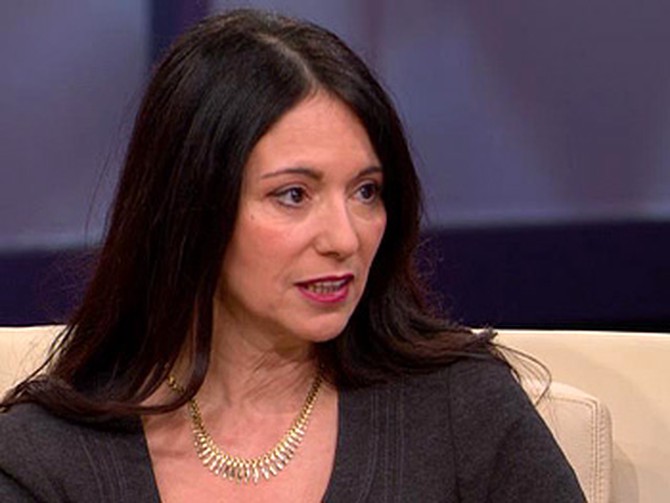
Christina's oncologist, Dr. Philomena McAndrew, an attending physician at Cedars-Sinai Medical Center in Los Angeles. Dr. McAndrew explains the role that the BRCA1 and BRCA2 genes play in breast cancer.
The BRCA genes are genes that ordinarily help prevent breast and ovarian cancers. When someone tests positive for a BRCA gene mutation, it means there is a slight change in her BRCA gene that inhibits it from carrying out its job of prevention.
If you happen to have a gene mutation, your chances of developing breast cancer are significantly greater. But that does not mean you will definitely develop the disease. "In people that have the BRCA gene mutation, the chance [in their] lifetime of getting breast cancer is up to 87 percent," Dr. McAndrew says.
A simple blood test can determine if you carry a BRCA gene mutation. Dr. McAndrew recommends getting tested if you:
The BRCA genes are genes that ordinarily help prevent breast and ovarian cancers. When someone tests positive for a BRCA gene mutation, it means there is a slight change in her BRCA gene that inhibits it from carrying out its job of prevention.
If you happen to have a gene mutation, your chances of developing breast cancer are significantly greater. But that does not mean you will definitely develop the disease. "In people that have the BRCA gene mutation, the chance [in their] lifetime of getting breast cancer is up to 87 percent," Dr. McAndrew says.
A simple blood test can determine if you carry a BRCA gene mutation. Dr. McAndrew recommends getting tested if you:
- Were diagnosed with breast cancer before you turned 50
- Had ovarian cancer
- Had a male family member with breast cancer
- Had breast cancer in one breast and then again in the other breast
- Have lost family members to breast cancer before they turned 50
- Practice surveillance—have a mammogram and MRI every six months
- Preventative chemotherapy
- Preventative double mastectomy
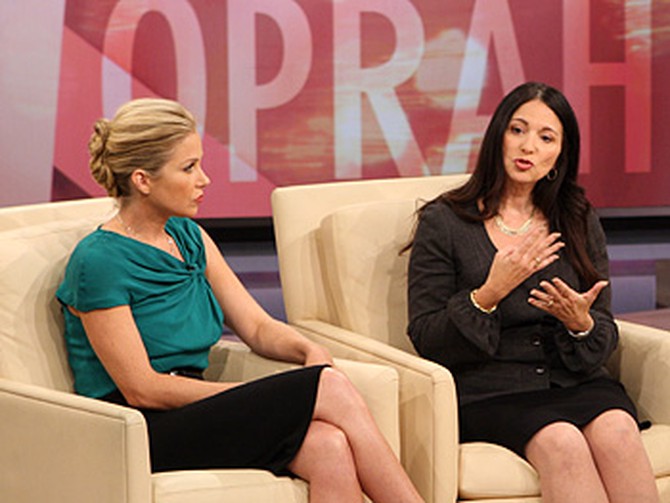
One factor that can affect the accuracy of a mammogram is the density of your breasts. According to Dr. McAndrew, the density of a breast is determined by the amount of glandular tissue you have. In a mammogram, the glandular tissues are displayed as very dark areas. These areas make it difficult to see smaller changes in your breasts from year to year. "A very dense breast is like you're looking through a snowstorm," Dr. McAndrew says. "Only your radiologist can tell you [the density of your breasts]."
When seeing your physician, Dr. McAndrew says you should be your own advocate. Ask your doctor if you have dense breasts. If you learn your mammogram is "normal," find out what "normal" really means. "We really have to use all of the different treatment options that we have—breast self-examination. We need to mammogram," Dr. McAndrew says. "Possibly MRI, possibly ultrasound."
When seeing your physician, Dr. McAndrew says you should be your own advocate. Ask your doctor if you have dense breasts. If you learn your mammogram is "normal," find out what "normal" really means. "We really have to use all of the different treatment options that we have—breast self-examination. We need to mammogram," Dr. McAndrew says. "Possibly MRI, possibly ultrasound."
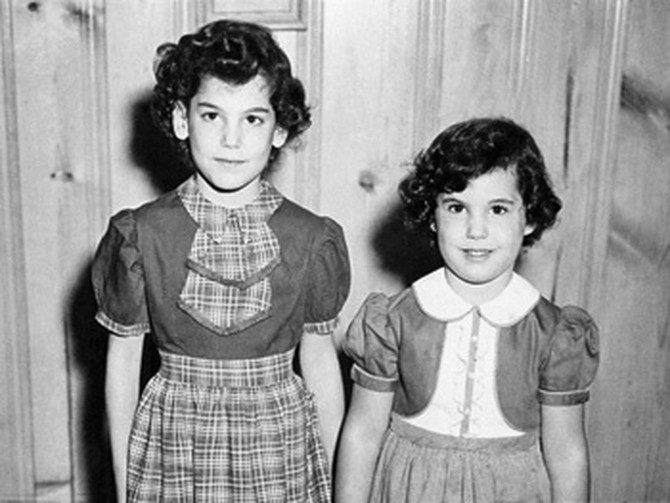
Growing up, sisters Suzy and Nancy were as close as two people could be. They were practically inseparable, singing, dancing and playing their way through childhood. As adults, they remained best friends and had a bond others would envy.
In 1978, when Suzy was just 33, she was diagnosed with breast cancer. "Back in 1978, nobody talked about [breast cancer]. Doctors barely knew how to treat it," Nancy says. "There wasn't an Internet, there were no 1-800 numbers to call. There were no support groups for young patients."
After an exhausting battle, Suzy lost her fight with the disease. Shortly before she died, she asked Nancy if they could work together to ensure that other women suffering would be able to get the support and information they so desperately needed. "She said, 'Nannie, when I get better, I want you to promise me that we're going to work to make sure that this doesn't happen to other families,'" Nancy says. Four years after Suzy passed away, Nancy was also diagnosed with the disease.
Nancy promised that if it took the rest of her life, she would raise awareness of breast cancer. "It's been almost 30 years," Nancy says. "And still there's not a day that goes by that I don't miss Suzy."
In 1978, when Suzy was just 33, she was diagnosed with breast cancer. "Back in 1978, nobody talked about [breast cancer]. Doctors barely knew how to treat it," Nancy says. "There wasn't an Internet, there were no 1-800 numbers to call. There were no support groups for young patients."
After an exhausting battle, Suzy lost her fight with the disease. Shortly before she died, she asked Nancy if they could work together to ensure that other women suffering would be able to get the support and information they so desperately needed. "She said, 'Nannie, when I get better, I want you to promise me that we're going to work to make sure that this doesn't happen to other families,'" Nancy says. Four years after Suzy passed away, Nancy was also diagnosed with the disease.
Nancy promised that if it took the rest of her life, she would raise awareness of breast cancer. "It's been almost 30 years," Nancy says. "And still there's not a day that goes by that I don't miss Suzy."
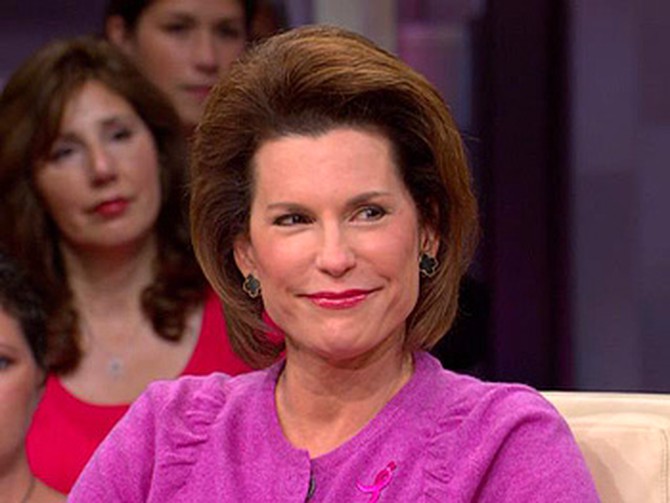
In 1982, Nancy Brinker founded Susan G. Koman for the Cure in honor of her beloved sister. The goal of the foundation is to create a network for survivors to help raise awareness, raise money through events like the Susan G. Komen Race for the Cure® to help fund research, and most importantly, give hope to those struggling with the disease. To date, the foundation has raised more than $1 billion for breast cancer research.
"I love our organization," Nancy says. "It is my sister to me."
"I love our organization," Nancy says. "It is my sister to me."
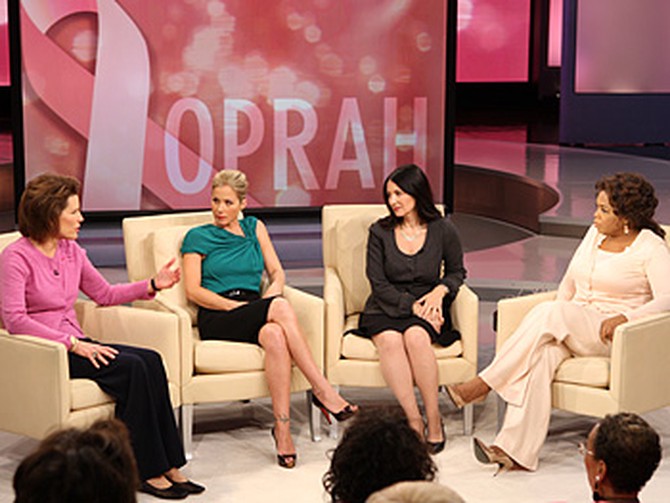
When Suzy was diagnosed, Nancy says people talked about it as if it were a automatic death sentence. She says people would cross the street when they saw her sister because they believed Suzy was contagious. It was this type of ignorance that Nancy was determined to change. In 1983, Nancy organized the first Susan G. Komen Race for the Cure®.
Nancy's dream was that the race would give people hope. "I was so disturbed at the way people talked about breast cancer. ... We've got to put hope in this thing. We've got to lighten up the landscape somehow. We've got to educate people," Nancy says. "First there must be awareness. Then there can be change."
Nancy says people told her the race wouldn't work because nobody wanted to talk about breast cancer. "It was drizzling that day," she says. "Everything was against us, but the people came." In all, 800 people attended the first race.
In 2008, the Race for the Cure celebrated its 25th anniversary. Over the years, more than 1 million people have participated. "This would be the one event that would make people relate and bond and celebrate survivorship and celebrate hope," Nancy says. "That's the most important thing—the hope."
Nancy's dream was that the race would give people hope. "I was so disturbed at the way people talked about breast cancer. ... We've got to put hope in this thing. We've got to lighten up the landscape somehow. We've got to educate people," Nancy says. "First there must be awareness. Then there can be change."
Nancy says people told her the race wouldn't work because nobody wanted to talk about breast cancer. "It was drizzling that day," she says. "Everything was against us, but the people came." In all, 800 people attended the first race.
In 2008, the Race for the Cure celebrated its 25th anniversary. Over the years, more than 1 million people have participated. "This would be the one event that would make people relate and bond and celebrate survivorship and celebrate hope," Nancy says. "That's the most important thing—the hope."

Millions of women around the globe struggle with the day-to-day reality of living with breast cancer. Maimah never believed she would be one of them. Since a young age, Maimah was taught to always do self-examinations—even though there was no history of the disease in her family. At age 32, she discovered her biggest fear, a lump.
Maimah immediately scheduled an appointment with her doctor, who performed an aspiration, but it was unsuccessful. The doctor told her to come back in six months so they could try again. In that time, the lump doubled in size, so Maimah insisted that a biopsy be done.
While waiting for the results of the biopsy, Maimah continued to go about her daily life, anxiously awaiting the results. While on a conference call at work, Maimah could see her other line ringing. The number was from her doctor's office. It was in that moment that she realized she had breast cancer. "I just knew, intuitively," Maimah says. When she was diagnosed, she immediately thought of the consequences. "I thought, 'I can't leave my daughter.' I'd have given my left leg and arm to stay here with her. I can't leave her without a mom," Maimah says. "I was terrified."
Today, two years after her diagnosis, Maimah is doing well but realizes now that her life before breast cancer wasn't what it should have been. "I had this whole facade of being superwoman, always being perfect. Breast cancer strips you of that because you realize that's not important," Maimah says. "All that matters is what's inside."
"Sounds like a spiritual journey as well," Oprah says. "For every woman I've ever talked to who has been through it, it's a spiritual transformation that occurs."
Maimah immediately scheduled an appointment with her doctor, who performed an aspiration, but it was unsuccessful. The doctor told her to come back in six months so they could try again. In that time, the lump doubled in size, so Maimah insisted that a biopsy be done.
While waiting for the results of the biopsy, Maimah continued to go about her daily life, anxiously awaiting the results. While on a conference call at work, Maimah could see her other line ringing. The number was from her doctor's office. It was in that moment that she realized she had breast cancer. "I just knew, intuitively," Maimah says. When she was diagnosed, she immediately thought of the consequences. "I thought, 'I can't leave my daughter.' I'd have given my left leg and arm to stay here with her. I can't leave her without a mom," Maimah says. "I was terrified."
Today, two years after her diagnosis, Maimah is doing well but realizes now that her life before breast cancer wasn't what it should have been. "I had this whole facade of being superwoman, always being perfect. Breast cancer strips you of that because you realize that's not important," Maimah says. "All that matters is what's inside."
"Sounds like a spiritual journey as well," Oprah says. "For every woman I've ever talked to who has been through it, it's a spiritual transformation that occurs."
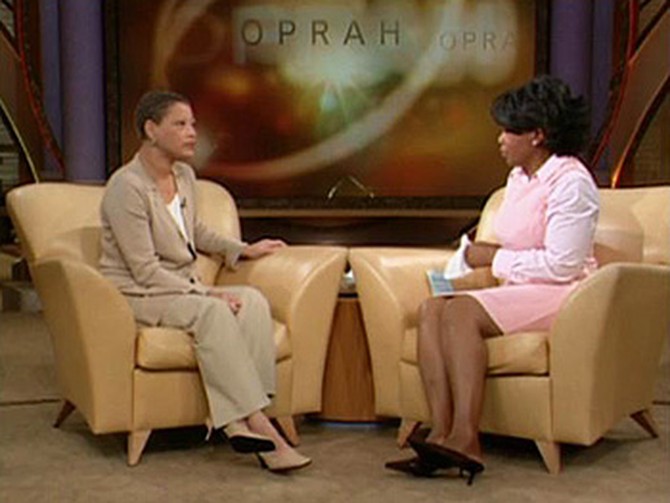
In 2002, Oprah met Charnette, a 32-year-old mother who battled an aggressive form of breast cancer. When Charnette found a lump under her arm, she knew in her gut something was wrong. Although her doctors told her not to worry, she demanded a mammogram.
Charnette shared her story with Oprah in hopes that her powerful message would help other young women. "I want every single woman watching this show right now—every single physician, every single person in charge of who gets screening and who does not—to know that breast cancer is a life-threatening disease for all women, not just women over the age of 40," she said. "Do not wait. Do not just take that smile and say: 'Okay, you're right. I'm fine.'"
Charnette shared her story with Oprah in hopes that her powerful message would help other young women. "I want every single woman watching this show right now—every single physician, every single person in charge of who gets screening and who does not—to know that breast cancer is a life-threatening disease for all women, not just women over the age of 40," she said. "Do not wait. Do not just take that smile and say: 'Okay, you're right. I'm fine.'"
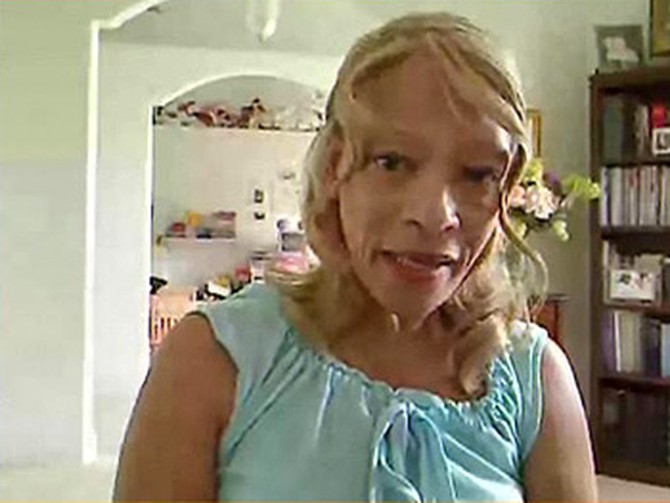
Charnette's cancer went into remission shortly after she appeared on the show. Sadly, her cancer has returned and spread to her lungs and brain.
Charnette is back with another life-changing message for women and medical professionals everywhere. "There's still so many young women being diagnosed with breast cancer every single day, and it needs to stop," she says. "We need to focus more attention on prevention of breast cancer, and we need to focus more attention on young women and on screening for young women."
Charnette says her two children, Gabby and Christian, pray every day for a cure. "So many mommies, so many young women, so many mothers are dying every day from breast cancer, and it just really needs to stop," she says.
As Charnette continues her fight against cancer, she works to spread hope by shining a spotlight on the disease. "In this world, it's not about how long we live but what we do with our time while we are here. That's why I have dedicated my life to doing everything I can to make sure that no other mother has to tell their child that they're not going to live long enough to see them grow up," she says. "I just hope, from bringing awareness to so many people, that together we can make this work and that we can end breast cancer in this lifetime."
Charnette is back with another life-changing message for women and medical professionals everywhere. "There's still so many young women being diagnosed with breast cancer every single day, and it needs to stop," she says. "We need to focus more attention on prevention of breast cancer, and we need to focus more attention on young women and on screening for young women."
Charnette says her two children, Gabby and Christian, pray every day for a cure. "So many mommies, so many young women, so many mothers are dying every day from breast cancer, and it just really needs to stop," she says.
As Charnette continues her fight against cancer, she works to spread hope by shining a spotlight on the disease. "In this world, it's not about how long we live but what we do with our time while we are here. That's why I have dedicated my life to doing everything I can to make sure that no other mother has to tell their child that they're not going to live long enough to see them grow up," she says. "I just hope, from bringing awareness to so many people, that together we can make this work and that we can end breast cancer in this lifetime."
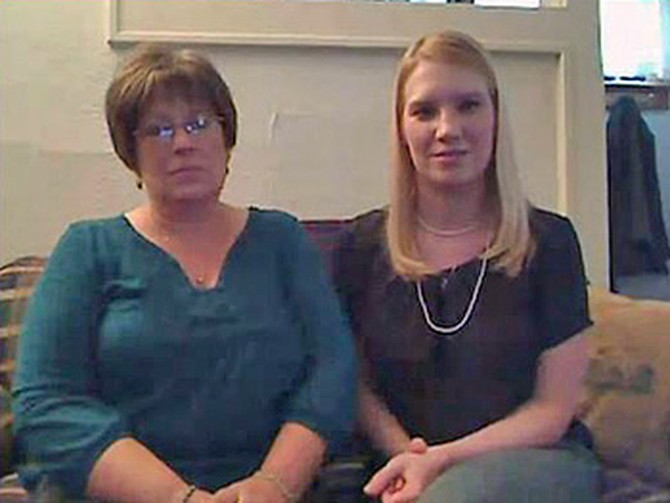
Jeannie and her mom, Betsy, join the discussion on Skype™ from their living room. Betsy is battling stage 3 breast cancer, and Jeannie wants to know if there are any lifestyle changes she can make now to remain cancer-free in the future.
Prevention starts with some basic diet changes. The more overweight you are, Dr. McAndrew says, the higher your risk for developing any type of cancer. "A very large nutritional study [of women who already had breast cancer] showed there was a 25 percent reduction in the cancer spreading if the women went on low-fat diets," she says. "This was a number similar to what some drugs could do."
Exercise can also decrease your risk, Dr. McAndrew says, and it's better to start sooner rather than later. "We need to start thinking about [lifestyle changes] not only when we're full adulthood, but for our children," she says. "That's when we're going to see the biggest reduction is when we start those interventions, when we start having our young adults, our teenagers, our preteens exercise, eat well."
Prevention starts with some basic diet changes. The more overweight you are, Dr. McAndrew says, the higher your risk for developing any type of cancer. "A very large nutritional study [of women who already had breast cancer] showed there was a 25 percent reduction in the cancer spreading if the women went on low-fat diets," she says. "This was a number similar to what some drugs could do."
Exercise can also decrease your risk, Dr. McAndrew says, and it's better to start sooner rather than later. "We need to start thinking about [lifestyle changes] not only when we're full adulthood, but for our children," she says. "That's when we're going to see the biggest reduction is when we start those interventions, when we start having our young adults, our teenagers, our preteens exercise, eat well."
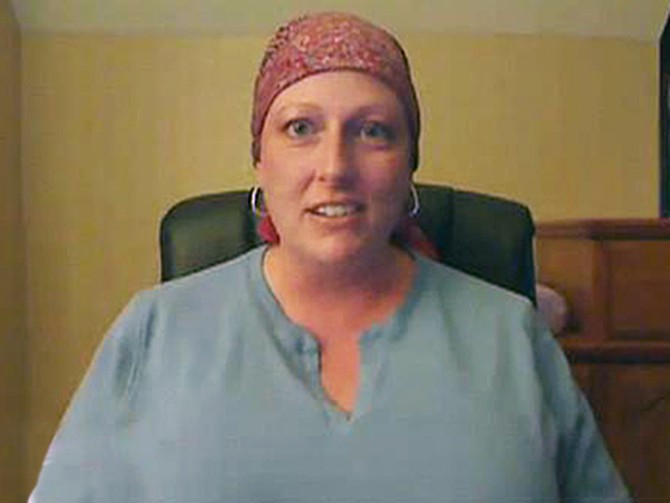
Dina, a Pennsylvania woman in the midst of breast cancer treatment, is also Skyping in to share her story. Dina says she discovered her cancer on her own a few months ago. "I was sitting on the couch, and I had a scratch and I found it," she says. At the time, she was 18 weeks pregnant.
Now, Dina is 37 weeks pregnant, and she says she just finished her first round of chemotherapy. Two weeks after the baby is born, she will go in for her second round, followed by radiation treatments.
Dina asks Dr. McAndrew what women can do to avoid a similar diagnosis. "I think that examining your breasts—pregnant or not pregnant—but especially during pregnancy, it gets very confusing," Dr. McAndrew says. When expecting, she says women may confuse inflamed milk ducts for lumps.
If you notice a persistent change or redness, Dr. McAndrew suggests seeing a physician. "Oftentimes your doctor will give you antibiotics because they think that you have a mastitis," she says. "If that doesn't go away, then one should probably be seen either by your obstetrics gynecologist or maybe a breast surgeon."
There are a few safe ways to investigate suspicious masses during pregnancy. "One can ultrasound. We don't tend to do mammograms during pregnancy. Oftentimes, the breasts are very dense at that point," Dr. McAndrew says. "Lactating breasts are extremely dense, and it's even hard to do an MRI in that setting. But the important thing here is examining your own breasts—realizing something is different [and] presenting it to your doctor so you can have the therapy."
Now, Dina is 37 weeks pregnant, and she says she just finished her first round of chemotherapy. Two weeks after the baby is born, she will go in for her second round, followed by radiation treatments.
Dina asks Dr. McAndrew what women can do to avoid a similar diagnosis. "I think that examining your breasts—pregnant or not pregnant—but especially during pregnancy, it gets very confusing," Dr. McAndrew says. When expecting, she says women may confuse inflamed milk ducts for lumps.
If you notice a persistent change or redness, Dr. McAndrew suggests seeing a physician. "Oftentimes your doctor will give you antibiotics because they think that you have a mastitis," she says. "If that doesn't go away, then one should probably be seen either by your obstetrics gynecologist or maybe a breast surgeon."
There are a few safe ways to investigate suspicious masses during pregnancy. "One can ultrasound. We don't tend to do mammograms during pregnancy. Oftentimes, the breasts are very dense at that point," Dr. McAndrew says. "Lactating breasts are extremely dense, and it's even hard to do an MRI in that setting. But the important thing here is examining your own breasts—realizing something is different [and] presenting it to your doctor so you can have the therapy."
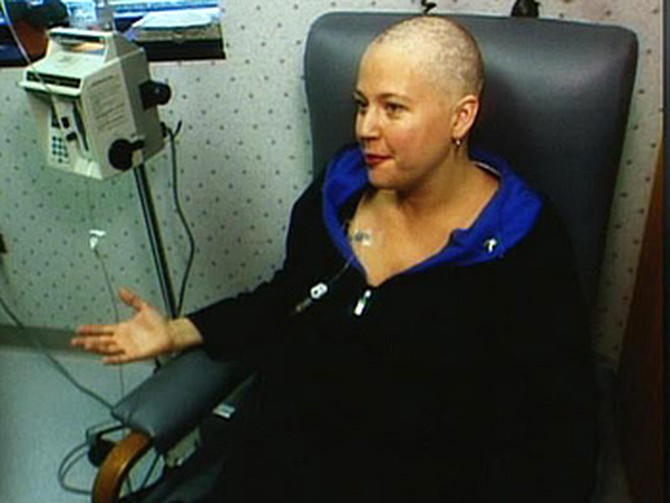
In 2002, Oprah went to a chemotherapy session with Laurie, a mother of two with breast cancer.
Six weeks into the intense treatment, Laurie was tired and had lost her hair. Although she said she was scared when she first started, she remained optimistic. "I just want this to be over with," she said.
Oprah watched as nurses injected the contents of a large syringe into the IV Laurie was attached to. "This is one of the two drugs she gets. It's toxic. It's killing the cells that are growing too fast in her body," said Judy, the nurse. "That's why she has side effects. That's why she's lost her hair."
Throughout treatment, Laurie kept a photo of her daughters in her hands. "You look at that and then you say, 'I can take this,'" she said.
Six weeks into the intense treatment, Laurie was tired and had lost her hair. Although she said she was scared when she first started, she remained optimistic. "I just want this to be over with," she said.
Oprah watched as nurses injected the contents of a large syringe into the IV Laurie was attached to. "This is one of the two drugs she gets. It's toxic. It's killing the cells that are growing too fast in her body," said Judy, the nurse. "That's why she has side effects. That's why she's lost her hair."
Throughout treatment, Laurie kept a photo of her daughters in her hands. "You look at that and then you say, 'I can take this,'" she said.
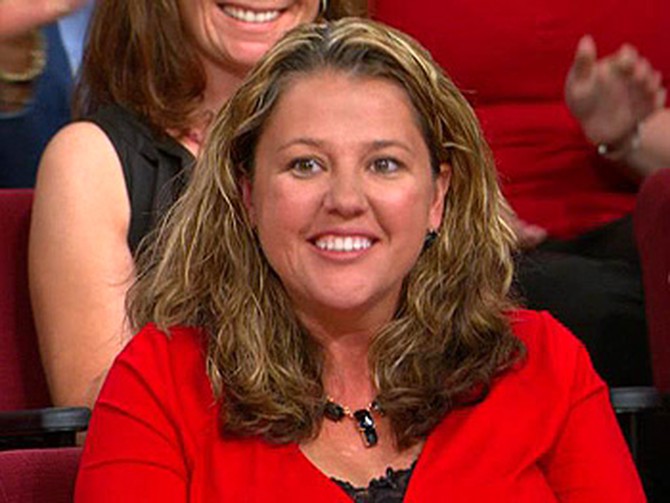
Today, Laurie is proud to say she is cancer-free. "I'm a six-year survivor," she says, "I also have a new addition to my family, a baby boy."
Oprah says that before attending Laurie's treatment, she had no idea what chemotherapy really was. "It's just that big, vast word—chemotherapy," she says.
Laurie says most people don't know what it means. "I never even knew what an oncologist was before I was diagnosed," Laurie says. "It's a matter of bringing hope. It's a matter of bringing knowledge."
After all she's been through, Laurie says she's thrilled to be able to give this message to everyone struggling with cancer or people who know someone who's fighting the same battle. "There is life after diagnosis," she says. "You just have to be positive about everything."
Oprah says that before attending Laurie's treatment, she had no idea what chemotherapy really was. "It's just that big, vast word—chemotherapy," she says.
Laurie says most people don't know what it means. "I never even knew what an oncologist was before I was diagnosed," Laurie says. "It's a matter of bringing hope. It's a matter of bringing knowledge."
After all she's been through, Laurie says she's thrilled to be able to give this message to everyone struggling with cancer or people who know someone who's fighting the same battle. "There is life after diagnosis," she says. "You just have to be positive about everything."
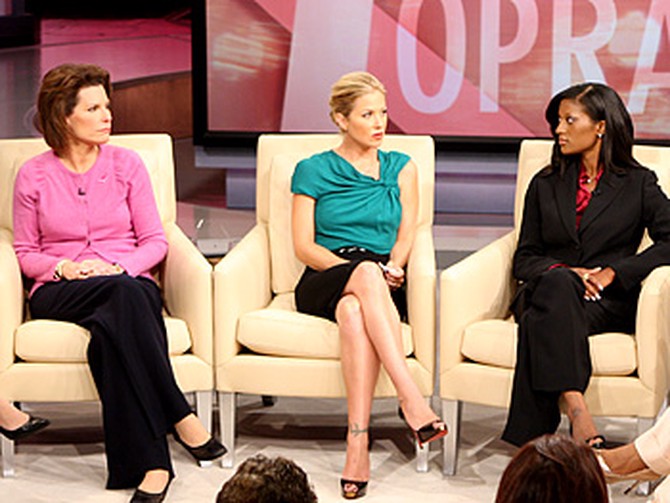
According to Susan G. Komen for the Cure, 25 million women around the world will be diagnosed with breast cancer in the next 25 years, and10 million of them will not survive.
Maimah says there are things you can do to help. For starters, give these men and women hands-on support—literally. "People need to be touched because you feel so alone. You feel so isolated," she says. Offering to be a treatment buddy is a great way to lend some extra support, as well.
Too many women battling breast cancer overestimate what they can realistically accomplish, so don't be afraid to step in and offer your help—even if it's for day-to-day tasks like grocery shopping and cleaning. "If they say, 'I don't need help; I'm strong,' don't listen to that woman. She's being superwoman. Ignore her," Maimah says.
Christina says one of the greatest gifts you can give to any woman in your life is education and encouragement to seek out early detection. "We've got to have early detection, early screening, prevention," Christina says. "Why I've come out is because I am a perfect example of early detection in that I'm not going to die from this disease." To continue raising awareness, Christina has started Right Action For Women (www.rightactionforwomen.org), a foundation dedicated to this cause.
Have more questions about breast cancer? Watch our exclusive after the show discussion!
Maimah says there are things you can do to help. For starters, give these men and women hands-on support—literally. "People need to be touched because you feel so alone. You feel so isolated," she says. Offering to be a treatment buddy is a great way to lend some extra support, as well.
Too many women battling breast cancer overestimate what they can realistically accomplish, so don't be afraid to step in and offer your help—even if it's for day-to-day tasks like grocery shopping and cleaning. "If they say, 'I don't need help; I'm strong,' don't listen to that woman. She's being superwoman. Ignore her," Maimah says.
Christina says one of the greatest gifts you can give to any woman in your life is education and encouragement to seek out early detection. "We've got to have early detection, early screening, prevention," Christina says. "Why I've come out is because I am a perfect example of early detection in that I'm not going to die from this disease." To continue raising awareness, Christina has started Right Action For Women (www.rightactionforwomen.org), a foundation dedicated to this cause.
Have more questions about breast cancer? Watch our exclusive after the show discussion!
Published 09/30/2008
As a reminder, always consult your doctor for medical advice and treatment before starting any program.

